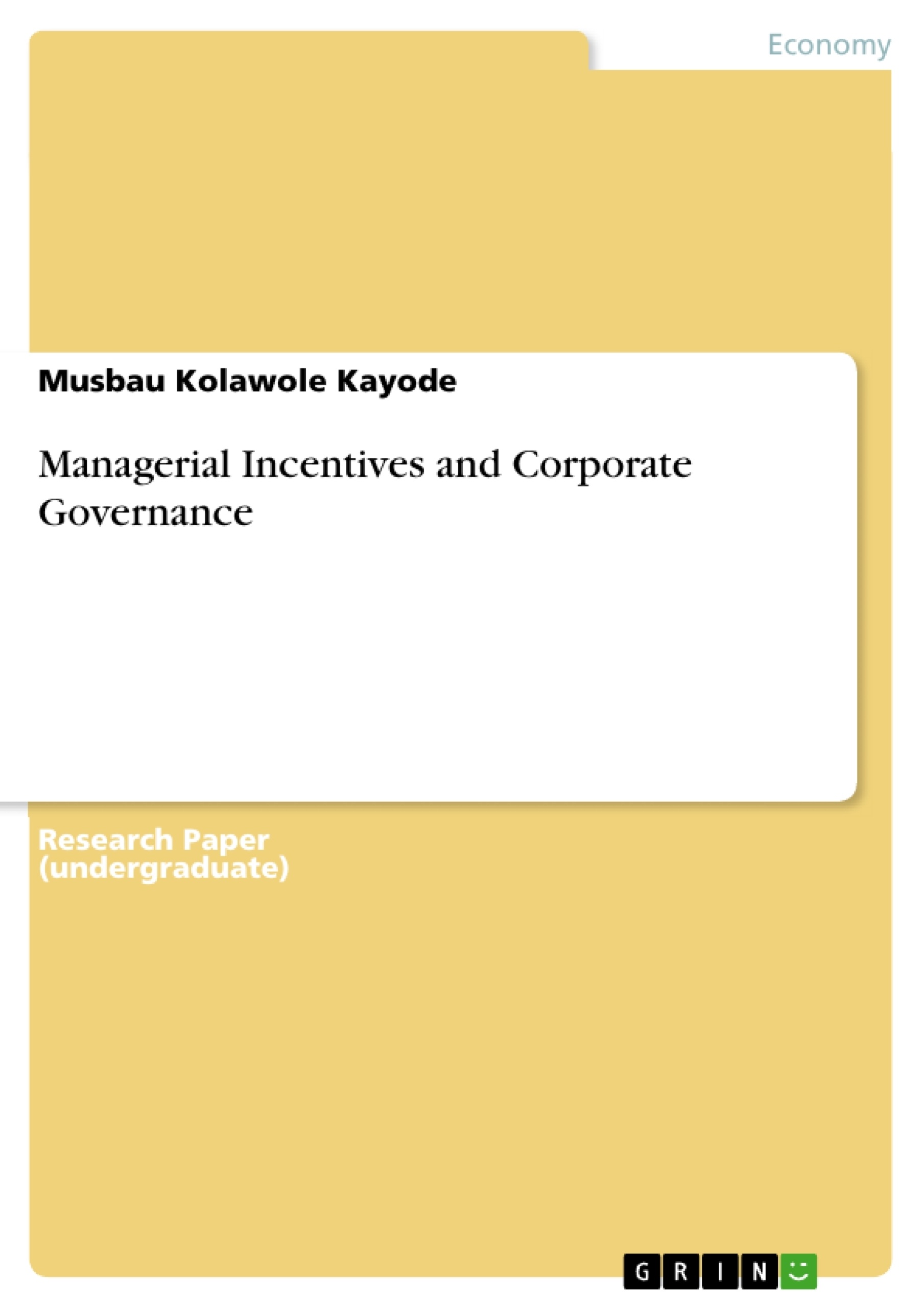Corporate governance involves different checks and balances with the ability to influence the incentives and monitoring of a firm’s management. Sound corporate governance is predominantly essential when a firm’s management is different from its ownership. Randall (2009) argued that in the absence of appropriate corporate governance, managers who are separate from a company’s ownership may not be incentivized to work hard towards achieving shareholders’ goal of maximizing profits. Instead, non-owner managers might end up lavishly spending money and other resources in ways that directly benefits themselves, for example on perks, and living an expensive life. Surprisingly, some other managers may be tempted to spend firm’s money to accumulate personal wealth through frauds or theft.
Inhaltsverzeichnis (Table of Contents)
- Managerial Incentives and Corporate Governance
- Agency Problem and Corporate Governance
- Managerial Ownership and Incentive Alignment
- Internal and External Control Mechanisms
- Risk-Aversion and Incentive Alignment
- Incentives for Growth and Efficiency
- Monitoring and Managerial Conduct
- Beyond Agency Problem: Intrinsic Motivation
- Compensation and Incentives: Salary, Bonuses, and Stock Options
- Stock Options: A Powerful Incentive
- Stock-Based Incentives: Global Trends
- Performance Measurement and Incentive Design
Zielsetzung und Themenschwerpunkte (Objectives and Key Themes)
This paper aims to explore the intricate relationship between managerial incentives and corporate governance, analyzing how they influence the behavior of managers and contribute to firm performance. It examines the challenges arising from the separation of ownership and control, highlighting the agency problem and its implications for shareholder value maximization.
- The role of incentives in aligning managerial actions with shareholder interests
- The impact of internal and external control mechanisms on mitigating the agency problem
- The relationship between managerial risk aversion and investment decisions
- The influence of monitoring and performance measurement on managerial conduct
- The interplay of extrinsic and intrinsic motivations in driving managerial performance
Zusammenfassung der Kapitel (Chapter Summaries)
- This section delves into the concept of corporate governance and its significance in influencing managerial incentives and monitoring. It emphasizes the potential for agency problems to arise when ownership and management are separate, leading to managers prioritizing their self-interests over shareholder value.
- This chapter explores the role of managerial ownership as a tool for aligning incentives and mitigating the agency problem. It examines how firms employ internal control strategies, including bonuses, stock options, and ownership stakes, to ensure managers act in the best interests of shareholders.
- This section discusses the various internal and external forces that contribute to managing agency costs. It highlights the importance of both internal incentive alignment and external market pressures in disciplining managerial behavior and safeguarding shareholder interests.
- This chapter analyzes the relationship between risk aversion and incentive alignment. It examines how managers' personal wealth tied to the firm may influence their risk appetite, potentially leading to suboptimal investment decisions. The discussion explores how aligning managerial incentives with shareholder interests can encourage risk-taking and foster organizational growth.
- This section explores the positive correlation between managerial ownership and firm efficiency. It examines how incentives, particularly stock options, can motivate managers to pursue strategies that enhance organizational growth and profitability. The chapter also explores the potential challenges and limitations associated with stock-based incentives.
- This section highlights the role of monitoring by capital markets in restraining managerial control and ensuring alignment with shareholder interests. It argues that managers, when aware of being monitored, are more likely to prioritize decisions that benefit the organization rather than their personal gains.
- This chapter extends the discussion beyond the agency problem, acknowledging the influence of intrinsic motivations on managerial performance. It explores the role of factors such as corporate culture, trust, social responsibility, and personal fulfillment in motivating managers to work hard and contribute to organizational success.
- This section delves into the different forms of managerial compensation, including salary, bonuses, and stock options. It examines how these components of remuneration can be effectively designed to align managerial incentives with shareholder interests and promote organizational growth.
- This chapter focuses on the widespread use of stock options as a powerful incentive to encourage managers to maximize shareholder value. It highlights the prevalence of stock option programs across various industries and their impact on organizational performance.
- This section explores the global trend of utilizing stock-based incentives to motivate managers. It highlights the increased adoption of equity-based pay in countries like Japan and Germany, recognizing its potential to align managerial interests with shareholder value maximization.
- This chapter examines the challenges associated with performance measurement and incentive design. It highlights the potential for manipulation and unintended consequences when relying solely on accounting data for performance evaluation. The discussion emphasizes the importance of creating robust incentive structures that incentivize ethical behavior and long-term value creation.
Schlüsselwörter (Keywords)
This paper examines the relationship between managerial incentives, corporate governance, agency problem, shareholder value, risk aversion, internal control mechanisms, external market forces, monitoring, performance measurement, compensation, stock options, and organizational growth. The analysis focuses on aligning managerial actions with shareholder interests and mitigating potential conflicts of interest.
- Citation du texte
- Musbau Kolawole Kayode (Auteur), 2015, Managerial Incentives and Corporate Governance, Munich, GRIN Verlag, https://www.grin.com/document/305469



